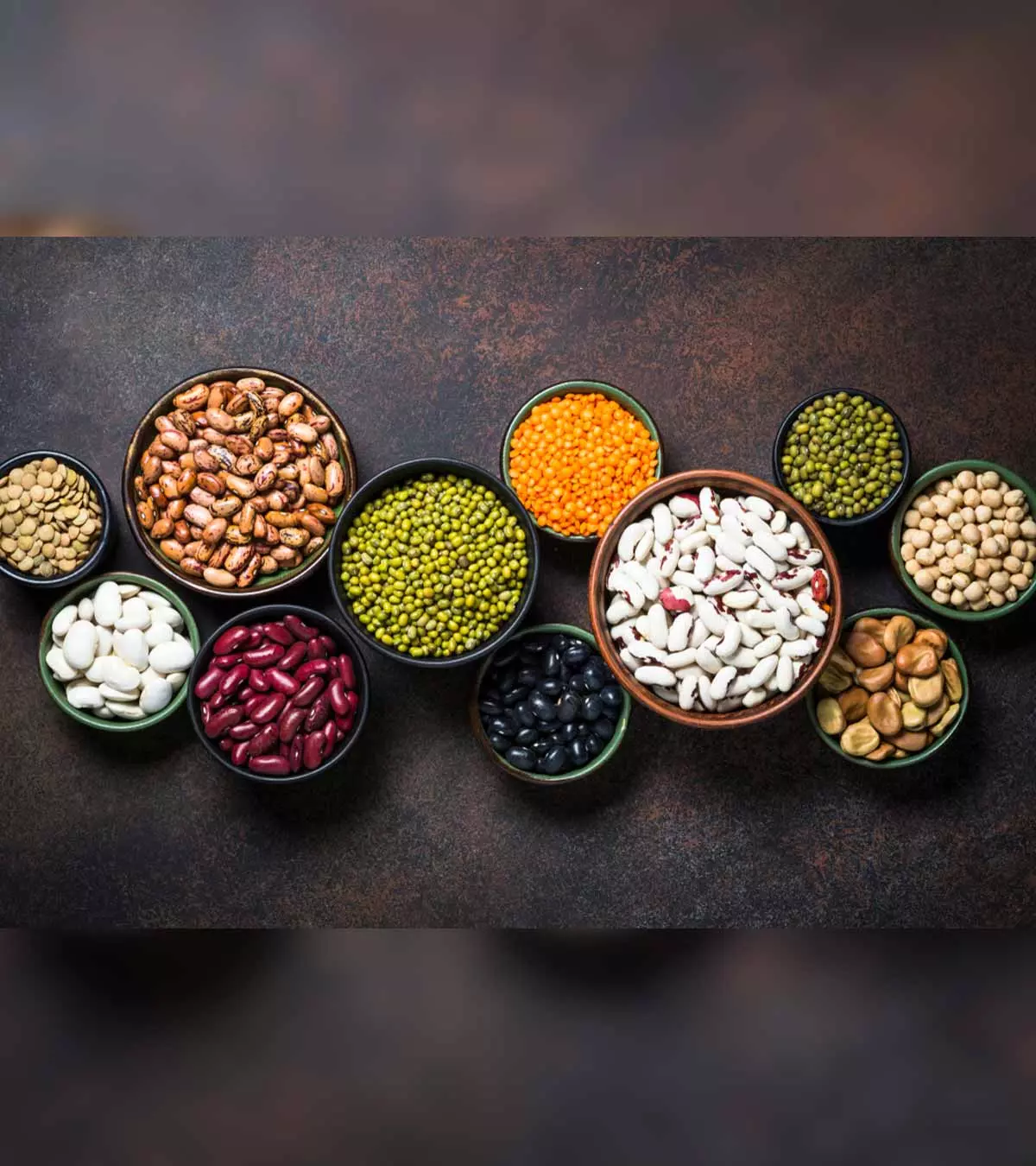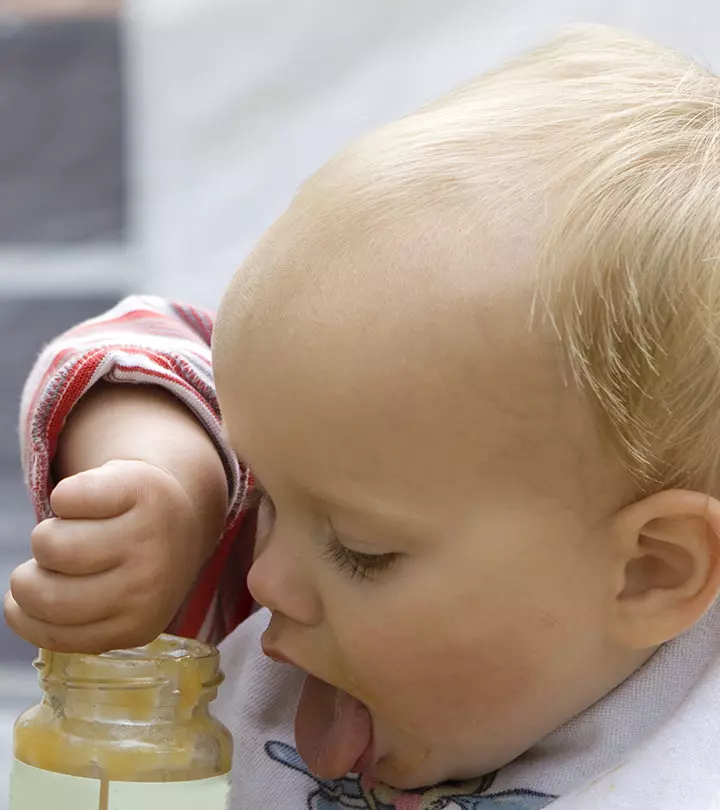
Image: Shutterstock
The refreshing aroma and the tangy taste of lemon can relieve morning sickness in pregnant women.

However, many are curious to know about the safety of lemon water during pregnancy. Lemon water in moderation is considered safe during pregnancy. It provides health benefits such as better digestion, relief from constipation, and protection from infections. Moreover, one raw and peeled lemon contains about 17 calories and a good amount of minerals and vitamins such as calcium, niacin, folate or folic acid, magnesium, vitamin C, B 6, and riboflavin. Most of these are required prenatal vitamins. So, read on to know more about the benefits of lemon water, its possible side effects, and some delicious recipes.
Key Pointers
- Drinking lemon water in moderation is safe during pregnancy.
- Lemon water can aid in various health benefits during pregnancy, such as hydration, morning sickness, blood pressure regulation, immunity, constipation relief, digestion, and reducing swollen feet.
- Lemon water is a diuretic with antioxidant properties.
- It is recommended to avoid ice-cold lemon juice and store-bought lemonade during pregnancy.
- However, drinking lemon water has been linked to heartburn, dental issues, and cold or cough symptoms. It is advisable to consult a gynecologist and a dentist before consuming lemon water during pregnancy.
Is It Safe To Drink Lemon Water During Pregnancy?
Lemon water is generally considered safe to be consumed during pregnancy when taken in moderation.
The smell of lemon has been reported to help deal with the symptoms of nausea and vomiting during pregnancy. Other ways of consumption of lemon include lemon juice or lemon tea. However, make sure to consult your doctor before including lemon in your pregnancy diet to avoid complications.
Prefer freshly squeezed lemon water over canned or bottled ones. Excess consumption of lemon can lead to fast detoxification.
Benefits Of Lemon Water During Pregnancy
Fruits and vegetables are an important part of a healthy pregnancy diet and lemon is one of such essential foods. Learn how you may benefit from lemon water during pregnancy.
1. Keeps you hydrated
Lemon juice might help you stay hydrated during pregnancy to prevent conditions such as nausea, headaches, edema, cramps, and dizziness.
2. Relieves morning sickness

Image: Shutterstock
According to a journal published by the American College of Nurse-Midwives, sucking on lemon may help to give relief from nausea and vomiting (1). Yet another randomized study finds that inhalation of lemon scent could reduce nausea and vomiting (2).
3. Keeps your blood pressure normal
Blood pressure changes during pregnancy are common. According to the US Centers for Disease Control and Prevention (CDC), up to 12% of pregnancies in the US are affected by high blood pressure.
Lemon is a versatile citrus fruit rich in vitamin C and several antioxidants, which can help control free radical damage. In this context, including it in a well-balanced, healthy diet might help expectant mothers maintain healthy blood pressure and prevent associated health conditions.
One study conducted on a small group of pregnant women showed that lemon juice with its vitamin C content reduced pregnancy-induced hypertension (3). The vitamin C content in lemons might strengthen blood vessels and may play a role in reducing high blood pressure.
4. Improves digestion
It is quite normal to suffer from indigestion problems during pregnancy. Lemon water is an old remedy that may help indigestion.
5. Helps prevent constipation
According to the Natural Pregnancy Cookbook by Sonali Ruder, consuming one glass of lemon juice every day helps prevent constipation.
6. Boosts immunity
Lemon water is believed to help prevent common infections such as common cold, flu, and some kinds of fever. The vitamin C content in lemon might help improve your body’s natural defense mechanism and combat bacteria and viruses (4).
7. Improves bone health
The reference daily intake (RDI) of calcium and magnesium in pregnancy is 1,000 and 350 milligrams per day, respectively (5). Lemon water offers around 26mg of calcium and 8mg of magnesium per 100 grams (6). It might thereby improve you and your baby’s bone health and development.
8. Has diuretic properties
Lemon water is known for its diuretic properties (7). It may help maintain healthy kidney functions.
9. Helps reduce swollen feet

Image: IStock
Some believe that taking a spoonful of lemon juice with lukewarm water eases out the pain and may reduce edema.
10. Helps eliminate toxins
Lemons are believed to be natural cleansers as per the findings in the book, Super Drinks For Pregnancy by Fiona Wilcock. Lemon water could help eliminate the toxins from the body and may protect you from infections during pregnancy.
11. Might ease labor
People believe that drinking lemon juice with honey can help ease labor. However, there is no scientific evidence. You may try it in consultation with your doctor.
 Quick tip
Quick tipPossible Side Effects Of Lemon Water During Pregnancy
Though lemons are thought to offer some benefits during pregnancy, they are also known to cause side effects. Therefore, it is always better to check with your gynecologist before you plan to include it in your diet.
1. Heartburn or gastrointestinal discomfort
During later stages of pregnancy, most pregnant women are likely to suffer from heartburn or other gastrointestinal distresses. The high acidic content in the lemons (8) may aggravate or trigger these conditions. If you are suffering from the above, it is better to avoid consuming lemons until the symptoms subside.
2. Dental problems
Your bones and teeth are highly prone to de-calcification while you are pregnant. The citric acid content in lemons might act as a trigger, damaging the teeth enamel. This could also lead to dental problems (9). You should avoid consuming large amounts of lemon water regularly, and check with your dentist if you notice changes in your teeth color or texture. Also, using a straw to limit the contact of the lemon water with your teeth and rinsing your mouth well after consuming lemon water might help.
3. Cold and cough
Drinking cold lemon water may cause cold and cough during pregnancy. It is ideal to have lemon water at room temperature or slightly warm lemon water, especially in the colder seasons.
Jamie Adams, a registered dietitian nutritionist and prenatal yoga teacher, says, “When consumed in moderation, lemon water is safe during pregnancy. However, side effects such as heartburn and weight loss may occur when consumed in excess as a lemon water detox and is not recommended to be used as a detox during pregnancy.”
Healthy Ways Of Making Lemon Water
You could prefer pasteurized lemon juice or fresh lemon to avoid harmful bacteria.
1. Lemon With Water:

Image: Shutterstock
- Cut the lemon into two halves and use one-half of it to extract juice.
- Add the juice to one glass of water.
- You might add a natural sweetener like honey
- Consume the lemon water immediately.
Note:
- You may use the other half to make the lemon water more concentrated or store it in an airtight container in the refrigerator to prepare another glass.
2. Lemon And Ginger Tea

Image: Shutterstock
- Boil one glass of water.
- Take one inch of ginger, peel and grate it.
- Take two slices of lemon. Add both ginger and lemon in water.
- Allow it to steep for ten minutes and then strain the tea.
Note:
- You may also use one tsp of ginger tea leaves instead of ginger root.
- You can also add lemon to your cooking. You can squeeze fresh lemon juice over lean proteins, salad, pasta, or over chicken or fish. It adds flavor and leaves you feeling refreshing and light.
Some Tips You Should Follow

Image: Shutterstock
- The acidic nature of lemon may affect your teeth enamel. Therefore, after consuming lemon water, you should gargle and rinse your oral cavity to lessen the dental problems.
- When you start taking lemon in your pregnancy diet, you should begin with small amounts to check if you are experiencing any heartburn or gastrointestinal discomforts.
- Make sure you use fresh lemon and freshly squeezed lemon juice.
- One full lemon will be too much for some women. Therefore, an active concentration of lemon water is not suggested.
- It is better to add lemon juice to warm water rather than boiling water as its effects may not be significant in boiling water.
 Quick tip
Quick tipLemon water is unlikely to interact with the medications that you consume. However, it is advisable to consult your doctor before making lemon water a part of your regular healthy diet.
Frequently Asked Questions
1. Is lemonade good for pregnancy?
Lemonade is a refreshing drink that might relieve morning sickness during pregnancy (10), and also provides you with good amounts of vitamin C. However, drinking an excess of sugary lemonade can cause extra weight gain. Fortunately, there are some artificial sweeteners approved by the Federal Drug Administration (FDA) for use in moderate levels during pregnancy. Lemonade that has artificial sweeteners like Stevia (Rebaudioside A), Equal or Nutrasweet (aspartame), Sunett (Acesulfame potassium) and Splenda (sucralose) can be taken without worrying. Pregnant women should not take aspartame if they have high blood levels of phenylalanine (11).
2. Can I drink lemon soda during pregnancy?
Lemon soda drinks often contain added caffeine and sweeteners, both not good when taken in excess amounts. Artificially sweetened drinks may also raise the risk of preterm labor. Also, your caffeine intake should be less than 200 milligrams per day (12). A typical soda may contain 35 to 55 milligrams of caffeine. Therefore, when it comes to sodas during pregnancy, you should be cautious. Also consider other sources of caffeine in your everyday diet, such as tea, coffee, chocolate, and other energy drinks.
3. Is lemon tea safe during pregnancy?
You may prefer drinking a small cup of homemade tea than bottled lemon tea as these drinks are high in sugars and might increase the risk of gestational diabetes.
4. Can I take lemon and cucumber water during pregnancy?
Lemon and cucumber water with a few sprigs of mint is a refreshing drink you might take during pregnancy. Lemons are natural cleansers and good for digestion, while cucumbers enhance hydration, and mint gives a fresh flavor. You could prepare the drink by blending a freshly sliced cucumber and adding water, lemon juice, and mint. You may enjoy this drink throughout the day.
5. Is med-lemon safe during pregnancy?
Med-lemon is a flavored medication that may combat colds and flu. It cannot be taken during pregnancy, especially in your first and third trimesters, except under the supervision of your gynecologist.
6. Can I use lemon oil during pregnancy?
Lemon oil might be used as an aroma-therapeutic oil during pregnancy as long as you use it in diluted and sparing amounts.
7. Is lemon good for acne during pregnancy?
The acidic nature of lemon could treat acne during pregnancy. You may apply some lemon juice on the acne-affected skin area, leave for five minutes, and then rinse off using water. An everyday application can remove dirt, which clogs acne and also softens the accumulated sebum.
8. What is the recommended daily amount of lemon water to drink during pregnancy?
The ideal quantity of lemon water intake depends on the individual. Drinking numerous glasses of this beverage daily is permissible, provided it doesn’t harm your health. However, if it triggers heartburn or deteriorates your teeth, reducing your consumption and adding more water to the mixture is advisable (14).
9. How can lemon water help with digestion during pregnancy?
The citric acid in lemon juice may stimulate the production of stomach acid, helping improve digestion (15).
10. Can drinking lemon water help with weight management during pregnancy?
No, drinking lemon water does not help with weight management. Despite claims that lemons possess fat-burning qualities, no scientific evidence supports this. Drinking water with lemon may help fill you up and reduce hunger cues, but it is unlikely to help you maintain a healthy weight (16).
Lemon water is a refreshing beverage that contains essential nutrients, such as vitamin C and antioxidants. Regular consumption of fluids such as freshly made, low-sugar lemon water during pregnancy can keep you hydrated, fight morning sickness, and aid in healthy digestion, benefiting your and your baby’s health. It may also help you handle your sour-food cravings. But its excessive intake can cause gastrointestinal issues, such as heartburn and dental problems. Therefore, keeping its intake in moderation is advisable. You can drink plain lemon water or use it to make delectable drinks, such as lemon ginger tea.
Infographic: Benefits Of Lemon Water During Pregnancy
Lemon is a rich source of vitamin C and helps deal with morning sickness during pregnancy. But it is not just that. You can reap several other benefits by consuming lemon water during pregnancy. We have compiled those for you in the following infographic. So, read on and be sure to keep the list handy.
Some thing wrong with infographic shortcode. please verify shortcode syntax
Illustration: Is It Safe To Drink Lemon Water During Pregnancy?

Image: Stable Diffusion/MomJunction Design Team
References
1. Nausea And Vomiting During Pregnancy; American College of Nurse-Midwives; University of Rochester Medical Center (2006)
2. Parisa Yavari kia et al.; The Effect of Lemon Inhalation Aromatherapy on Nausea and Vomiting of Pregnancy: A Double-Blinded, Randomized, Controlled Clinical Trial; Iran Red Crescent Med J. (2014)
3. Uma Parvathi.; An Evaluative Study To Assess The Effectiveness Of Lemon Juice On Pregnancy Induced Hypertension Among Antenatal Mothers In Dommasandra Phc, Bangalore; International Journal of Advanced Research (IJAR) (2018)
4. Unim Hans and Byamukama Edward; Regular vitamin C supplementation during pregnancy reduces hospitalization: outcomes of a Ugandan rural cohort study; Pan Afr Med J. (2010)
5. Micronutrient Needs During Pregnancy and Lactation; Linus Pauling Institute | Oregon State University
6. Lemons, raw, without peel; 167746; Basic Report; USDA
7. Morton, J; Lemon – Citrus limon; Purdue University
8. Food Acidity; Kansas State University
9. Stefan Zimmer et al.; Influence of Various Acidic Beverages on Tooth Erosion. Evaluation by a New Method; PLoS One (2015)
10. Morning sickness; Department of Health; Government of Western Australia
11. Eliza Pope et al.; Sugar substitutes during pregnancy; Can Fam Physician. (2014)
12. Moderate Caffeine Consumption During Pregnancy; Moderate Caffeine Consumption During Pregnancy (2010)
13. Is lemonade a healthy fruit juice?; American Cancer Research Institute
14. 7 Health Benefits of Lemon Juice; UPMC HealthBeat
15. The health benefits of lemon; Texas A&M University
16. Lemon Coffee: Can It Help You Lose Weight?; Cleveland Clinic
Community Experiences
Join the conversation and become a part of our nurturing community! Share your stories, experiences, and insights to connect with fellow parents.
Read full bio of Dr. Shannon M. Clark
- Jamie Adams is a registered dietitian and certified prenatal yoga teacher. She did her masters in Clinical Nutrition at Rush University and has seven years of experience being self-employed. She specializes in dietetics and prenatal yoga.
 Jamie Adams is a registered dietitian and certified prenatal yoga teacher. She did her masters in Clinical Nutrition at Rush University and has seven years of experience being self-employed. She specializes in dietetics and prenatal yoga.
Jamie Adams is a registered dietitian and certified prenatal yoga teacher. She did her masters in Clinical Nutrition at Rush University and has seven years of experience being self-employed. She specializes in dietetics and prenatal yoga.
Read full bio of Swati Patwal
Read full bio of Rebecca Malachi
Read full bio of Aneesha Amonz

















